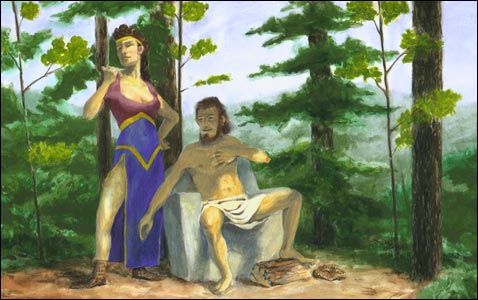|
|

|
|
|

|
|
|

|
|
|
|
Book Fourteen
|
|
|
|
Meanwhile, far behind the Greek lines, the wounded generals have gathered. Nestor (NESS-tor), Odysseus (oh-DISS-yoos), Diomedes (dy-uh-MEE-deez), and Agamemnon (a-guh-MEM-non) confer on a plan. Agamemnon proposes that the ships nearest to the coast put to sea and then in the night the others join them in a run for home. Odysseus minces no words in rejoinder, calling his commander a disaster whose words fill him with contempt. Agamemnon blandly accepts the charge and asks if anyone has a better idea. Diomedes proposes that they advance to the front where, unable to fight because of their wounds, they can at least egg on their men. Poseidon (puh-SY-dun), in the form of a grizzled veteran, offers words of encouragement to the leaders and a shout as loud as ten thousand men to brace the troops.
|
|
|
|
From Olympus, Hera (HEER-uh) notes the activities of her brother Poseidon and decides to see what she can do to be of assistance. If she can tempt Zeus (zyoos) into a romantic interlude followed by sleep, Poseidon will have even greater range for his efforts. Accordingly she takes to her chamber and annoints herself with ambrosia, followed by a fragrant olive-oil rubdown. Arraying herself in elegant robes and a tasseled waistband, she dons a golden broach, earrings, and a headdress of shimmering veils. She tricks Aphrodite (a-fro-DY-tee) into providing a secret weapon — the magical girdle of the goddess of love. With this sash tucked into her upper garment, Hera will be irresistable to Zeus.
|
|
|
|
Now Hera seeks out the deity Sleep and entreats him to work his spell on Zeus after she and the great god have had their tryst. Sleep at first refuses, remembering a previous occasion when Hera asked such a favor so that she might torment Zeus's favorite son, the great hero Heracles (HER-uh-kleez). Sleep had barely escaped Zeus's wrath. But Hera offers the hand of one of the Graces in marriage, and Sleep leaps at the opportunity. He makes Hera seal the bargain with an oath sworn on the underworld river Styx and witnessed by all the Titans, the first generation of supreme gods who are imprisoned in the pit of Tartarus (TAR-tuh-rus) far below the earth. Together Sleep and Hera travel to Mount Ida, where Zeus is keeping his vigil.
|
|
|
|
Sleep disguises himself as a bird and waits in a tree while Hera approaches her husband. Asked what brings her, Hera tells the same story she has told Aphrodite, that she is on her way to reconcile a quarrel between her stepparents Ocean and Tethys (TEH-this). Zeus barely listens, for he has been consumed by lust from the very first sight of Hera. Pausing only to enumerate a list of other goddesses and mortal women for whom he has felt a similar though lesser passion, Zeus draws his wife down onto the ground, which magically bursts forth with grass, flowers, and dewy clover. As soon as Sleep has done his part, he rushes to tell Poseidon that he is free to grant the Greeks at least a temporary triumph.
|
|
|
|
Foregoing any mortal guise, Poseidon fires up the Greeks with the strong voice of a god and personally leads them into battle. Undaunted, Hector rallies the Trojans. And it is Hector who casts the first spear. His aim is true and he strikes Ajax directly in the chest, but the spearpoint is repelled by the double thickness of sword- and shield-straps where they cross. As he is falling back into the ranks, Hector is struck by a rock hurled by Ajax. The blow sends him spinning and then crashing down in a clatter of armor. His lieutenants manage to carry him to his chariot and away from the battle. They lay him down on the bank of a river and splash him with water. Regaining consciousness, he staggers to his knees and spits blood before passing out again.
|
|
|
|
Meanwhile Hector's retreat has inspired the Greeks, although the battle veers back and forth in a series of challenges, kills, and revenges. Little Ajax downs a Trojan, whose death is met with the taunt that the fatal spear will serve as a crutch on the trudge down to the Underworld of the dead. Great Ajax responds by slaying a son of Antenor (an-TEE-nor) and pretending to suspect a family resemblance to that counselor of King Priam when he knows full well the identity of his victim. This kill too is avenged by a Trojan who straddles his fallen comrade to protect his armor from being hauled off as a prize. But he runs away at the approach of the Greek Peneleos (pee-NEL-ee-ohs), who finds another victim, lancing him full in the face and gouging out an eyeball, then hacking off his head with his sword. The head still impaled on his spearshaft, Peneleos holds it aloft as he boasts of his kill and taunts the Trojans to inform the victim's parents and wife that their loved one will not be returning home.
|
|
|
|
And now the momentum has swung to the Greek side and the greatest spoils are won by Little Ajax, since he excels at bringing down enemies as they flee.
|
|
|

|
|
|

|



